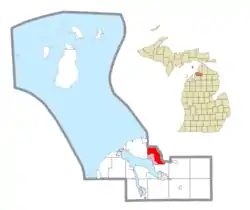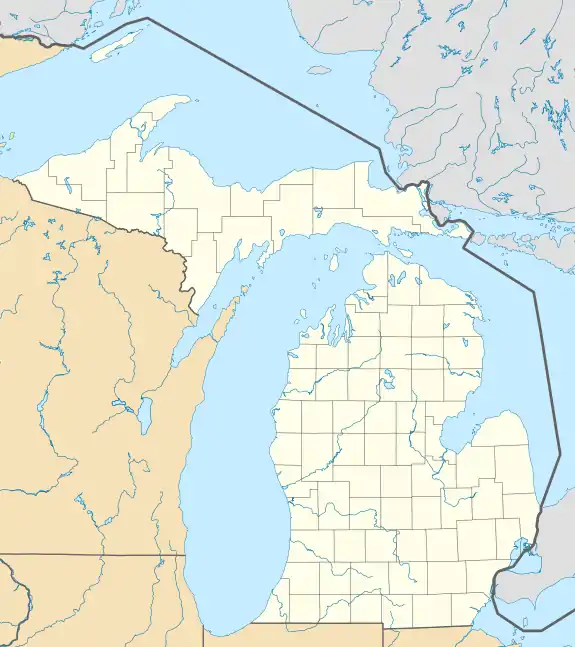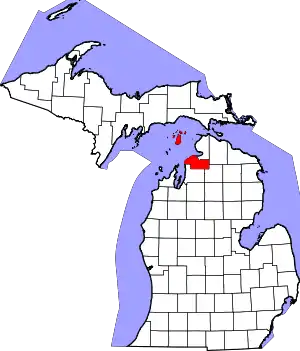Bay Township, Michigan
Bay Township is a civil township of Charlevoix County in the U.S. state of Michigan. As of the 2010 census, the township population was 1,122.[3] Bay Township's central village, Horton Bay, was featured in several of Ernest Hemingway's Nick Adams stories, including "The End of Something".
Bay Township, Michigan | |
|---|---|
 Location within Charlevoix County (red) and the administered community of Horton Bay (pink) | |
 Bay Township Location within the state of Michigan  Bay Township Bay Township (the United States) | |
| Coordinates: 45°17′39″N 85°04′11″W | |
| Country | United States |
| State | Michigan |
| County | Charlevoix |
| Government | |
| • Supervisor | Lawrence Moeschke |
| • Clerk | Wendy Simmons |
| Area | |
| • Total | 18.89 sq mi (48.9 km2) |
| • Land | 15.55 sq mi (40.3 km2) |
| • Water | 3.34 sq mi (8.7 km2) |
| Elevation | 846 ft (258 m) |
| Population (2010) | |
| • Total | 1,122 |
| • Density | 72.7/sq mi (28.1/km2) |
| Time zone | UTC-5 (Eastern (EST)) |
| • Summer (DST) | UTC-4 (EDT) |
| ZIP code(s) | |
| Area code(s) | 231 |
| FIPS code | 26-06000[1] |
| GNIS feature ID | 1625891[2] |
| Website | Official website |
Geography
Bay Township is located between Lake Charlevoix and Walloon Lake in the northern part of the Lower Peninsula of Michigan. The northeastern boundary of the township, which follows the center of Walloon Lake, is the Emmet County boundary. The unincorporated community of Horton Bay is located in the southwest part of Bay Township on the north side of Lake Charlevoix. Boyne City is 6 miles (10 km) to the south, and Bay Shore along Lake Michigan's Little Traverse Bay is 6 miles (10 km) to the north.
According to the United States Census Bureau, Bay Township has a total area of 18.9 square miles (48.9 km2), of which 15.6 square miles (40.3 km2) is land and 3.4 square miles (8.7 km2), or 17.70%, is water.[3]
Demographics
As of the census[1] of 2000, there were 1,068 people, 429 households, and 326 families residing in the township. The population density was 68.8 per square mile (26.6/km2). There were 787 housing units at an average density of 50.7 per square mile (19.6/km2). The racial makeup of the township was 97.28% White, 0.47% Native American, 0.56% Asian, 0.56% Pacific Islander, 0.28% from other races, and 0.84% from two or more races. Hispanic or Latino of any race were 0.56% of the population.
There were 429 households, out of which 29.4% had children under the age of 18 living with them, 68.1% were married couples living together, 4.7% had a female householder with no husband present, and 23.8% were non-families. 21.2% of all households were made up of individuals, and 8.4% had someone living alone who was 65 years of age or older. The average household size was 2.49 and the average family size was 2.86.
In the township the population was spread out, with 24.2% under the age of 18, 3.5% from 18 to 24, 26.5% from 25 to 44, 30.7% from 45 to 64, and 15.2% who were 65 years of age or older. The median age was 43 years. For every 100 females, there were 112.3 males. For every 100 females age 18 and over, there were 105.6 males.
The median income for a household in the township was $48,462, and the median income for a family was $55,268. Males had a median income of $38,462 versus $28,558 for females. The per capita income for the township was $25,594. About 1.8% of families and 4.9% of the population were below the poverty line, including 5.8% of those under age 18 and 2.3% of those age 65 or over.
References
- "U.S. Census website". United States Census Bureau. Retrieved 2008-01-31.
- U.S. Geological Survey Geographic Names Information System: Bay Township, Michigan
- "Geographic Identifiers: 2010 Demographic Profile Data (G001): Bay township, Charlevoix County, Michigan". U.S. Census Bureau, American Factfinder. Archived from the original on February 12, 2020. Retrieved August 29, 2014.
